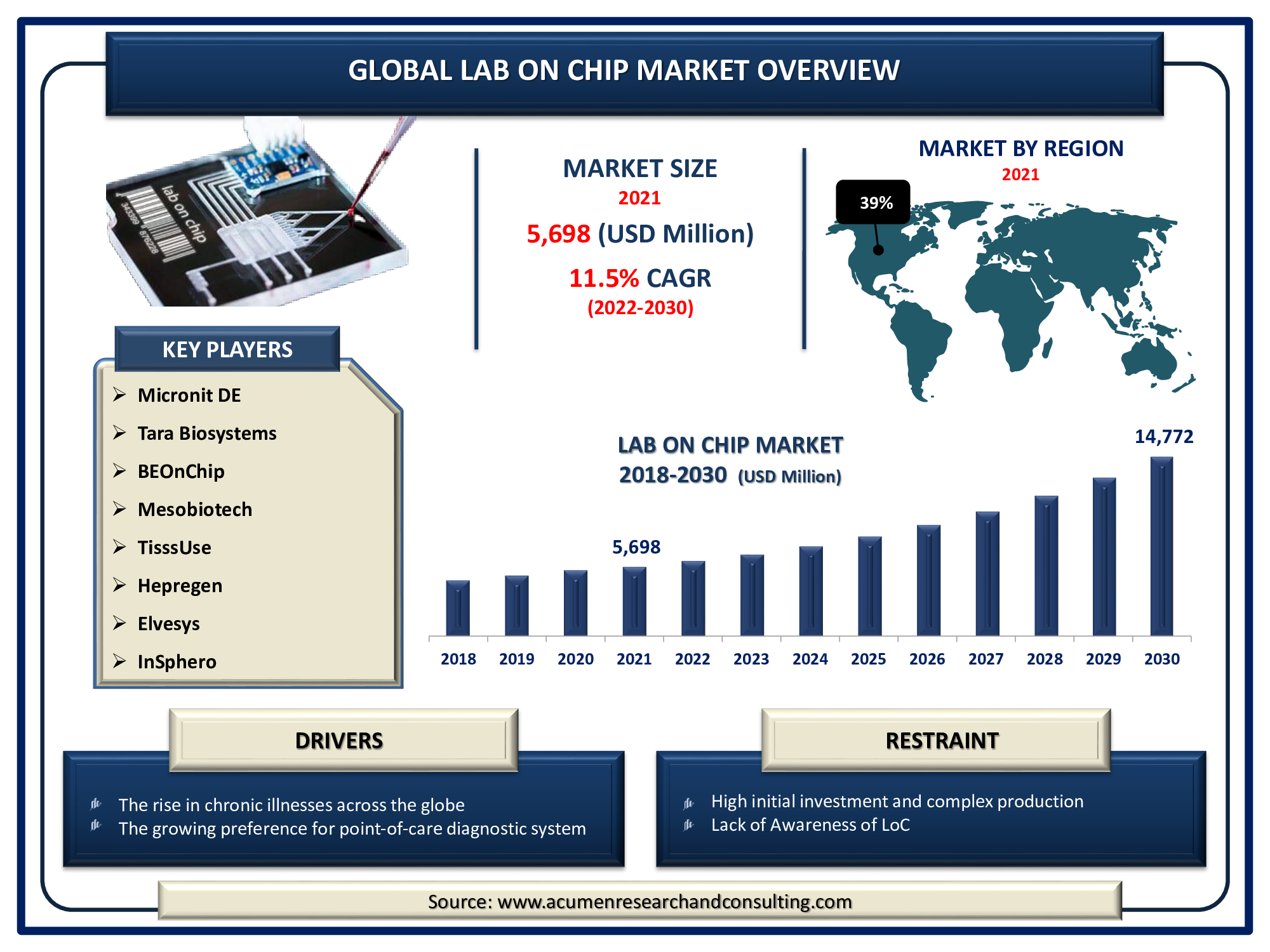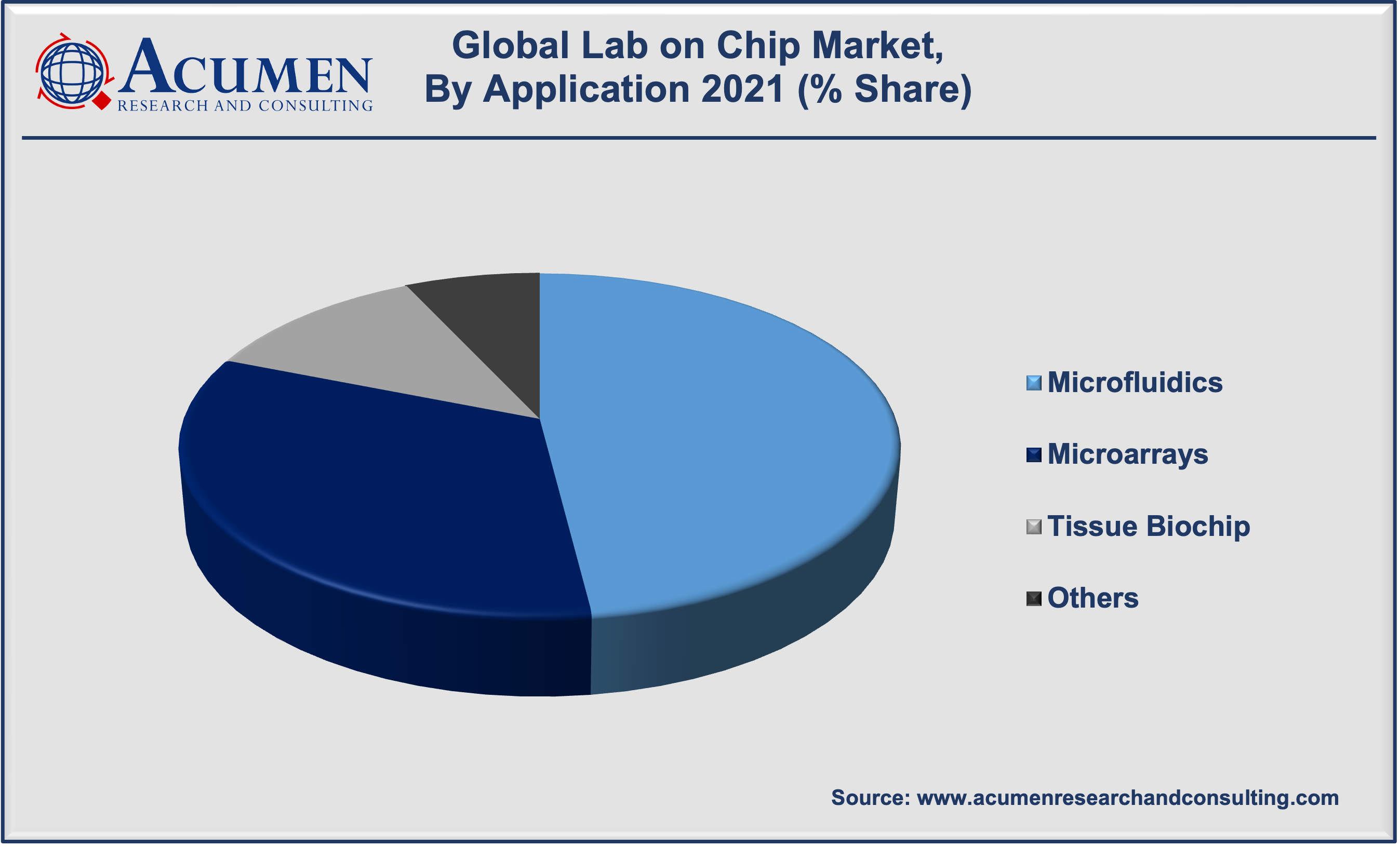Lab on Chip Market Analysis - Global Industry Size, Share, Trends and Forecast 2022 - 2030
Published :
Report ID:
Pages :
Format :
Lab on Chip Market Analysis - Global Industry Size, Share, Trends and Forecast 2022 - 2030
Report Coverage
- Industry Dynamics
- Market Size and Forecast Data
- Segment Analysis
- Competitive Landscape
- Regional Analysis with a Niche Focus on Country-Level Data
- High Level Analysis - Porter's, PESTEL, Value Chain, etc.
- Company Profiles of Key Players
- Option to Customize the Report As Per Your Specific Need
Request Sample Report
The Global Lab on Chip Market size was valued at USD 5,698 Million in 2021 and is expected to reach the value of USD 14,772 Million by 2030 growing at a CAGR of 11.5% during the forecast timeframe of 2022 to 2030.

A lab on chip is a small device that integrates multiple laboratory analytical techniques onto a single chip. Many laboratories' analytical techniques, such as DNA sequencing, biochemical analysis, PCR, and others, can be easily incorporated using lab on chip technology. This technique is associated with benefits such as parallelization, waste minimization, ergonomics, high assay sensitivity, and others. The microprocessor in this technology can be as small as a few square millimeters in size and can accommodate exceedingly small fluid amounts as small as picoliters. However, as a result of these factors, the global lab on chip market in the healthcare industry is predicted to grow significantly in the coming years.
Lab on Chip Market Dynamics
Drivers
- The rise in chronic illnesses across the globe
- The growing preference for point-of-care diagnostic instruments
- Increasing the use of genomes and proteomics in cancer research.
- Increasing life science and drug development research activity
Restraints
- High initial investment and complex production
- Lack of Awareness of LoC
Opportunity
- Expanded competition for customized medications
- Increasing semiconductor industry assistance for the development of innovative circuits for the medical sector
Report Coverage
| Market | Lab on Chip Market |
| Market Size 2021 | USD 5,698 Million |
| Market Forecast 2030 | USD 14,772 Million |
| CAGR During 2022 - 2030 | 11.5% |
| Analysis Period | 2018 - 2030 |
| Base Year | 2021 |
| Forecast Data | 2022 - 2030 |
| Segments Covered | By Product, By Technology, By Application, By End-Use, And By Geography |
| Regional Scope | North America, Europe, Asia Pacific, Latin America, and Middle East & Africa |
| Key Companies Profiled | Micronit DE, Tara Biosystems, BEOnChip, Mesobiotech, TisssUse, Hepregen, Elvesys, InSphero, AxoSim, Emulate Bio, Nortis Bio, and MIMETAS |
| Report Coverage |
Market Trends, Drivers, Restraints, Competitive Analysis, Player Profiling, Regulation Analysis |
| Customization Scope |
10 hrs of free customization and expert consultation |
The rise in the acceptability of highly individualized treatment, greater drug development and life science and research, and the need for slightly higher diagnostics are the factors driving the growth of the lab on chip market size. Furthermore, increasing R&D investments in emerging economies are projected to provide profitable opportunities for major market players throughout the forecast period. LoC is increasingly being utilized in medicine and botany to diagnose various infections and disorders such as New HIV diagnoses and chronic diseases. This is expected to help boost the lab on chip market revenue. Furthermore, due to advantages such as portability, computerized sample administration, and design flexibility, LoC devices are in great demand. As they provide quick and precise results, LoC devices are perfect for point-of-care diagnostics. This is another factor that is expected to drive market growth.
Aside from that, early higher purchasing rates and a lack of awareness about the application of lab on chip technologies in middle-income nations are limiting the market's progress. However, a lack of technical experience and the absence of appropriate technologies are projected to stymie industry growth.
Lab on Chip Market Segmentation
The global Lab on Chip market segmentation is based on the Product, Technology, Application, End-Use, and region.
Market by Product
- Reagents & Consumables
- Software
- IV Needles
Based on the product, the reagents and consumables segment is predicted to grow rapidly in the market in the approaching years. The increasing occurrence of infectious diseases needing early detection provides an opportunity for biotechnology industry participants to create appropriate reagents for various diagnostic tests. Furthermore, the development of new screening procedures and assays increases the reagent's market share. The biotechnology instrumentation market is expanding due to an increase in the number of biotech enterprises around the world, as well as an increase in pharmaceutical manufacturers' R&D spending, which is driving demand for biotechnology instrumentation. As a result, reagent demand is increasing in the market.
Market by Technology
- Microfluidics
- Microarrays
- Tissue Biochip
- Others
In terms of technology, the microfluidics segment will have the biggest market share in 2021. Microfluidics technologies are an intriguing alternative for tests such as chemical and biological assays due to characteristics such as reduced analysis time, reduced specimen and reagent usage, and a simpler automation procedure. A microfluidics platform allows for the parallel processing of assays, which reduces the overall cost of the assay. Increased demands for point-of-care (POC) testing, as well as the development of advanced lab on chip technological advancements in the field of point-of-care (POC) devices, are expected to boost microfluidics segment growth over the projection period. Additionally, growing emphasis on data precision and durability is projected to propel the microfluidics industry ahead.
Market by Application
- Genomics
- Drug Discovery
- Point of Care Diagnostics
- Proteomics
- Others

Based on application, the lab on chip industry is divided into genomics, drug discovery, point of care diagnostics, proteomics, and others. The genomics segment is expected to grow greatly as human innovation and technological progress in genetics and sequencing increase. Furthermore, excessive government spending in this industry will fuel segment expansion. Furthermore, the Point-of-Care Diagnostics category is anticipated to expand rapidly in the coming years. Point-of-care diagnostics (POC) is seen as a crucial component of healthcare, notably in the diagnosis of illnesses. The technology of microfluidics lends itself nicely to point-of-care diagnostics. This technology has the potential to deliver rapid and low-cost point-of-care testing tools to help combat the COVID-19 outbreak.
Market by End-Use
- Hospitals and Clinics
- Forensic Laboratories
- Biotechnology and Pharmaceuticals Companies
- Diagnostics Centers
- Academic and Research Institutes
Based on the end-use, the hospital and clinic segment is expected to grow at the fastest rate over the forecasting periods. A lab on a chip (LOC) is a tiny, automated laboratory system that can be used for a range of therapeutic applications both within and outside of the hospital. Applications such as testing blood glucose, blood gases, and cholesterol, as well as quantifying HIV cells, are driving further growth in the hospital and clinic segment.
Lab on Chip Market Regional Overview
North America
- U.S.
- Canada
Europe
- U.K.
- Germany
- France
- Spain
- Rest of Europe
Latin America
- Mexico
- Brazil
- Rest of Latin America
Asia-Pacific
- India
- Japan
- China
- Australia
- South Korea
- Rest of Asia-Pacific
The Middle East & Africa (MEA)
- Gulf Cooperation Council (GCC)
- South Africa
- Rest of the Middle East & Africa
North America is expected to become one of the largest market shares in this industry. The presence of major players in the region, government support for experiments, the disease's high prevalence, and an increase in screening procedures for various viral and harmful diseases in advanced countries such as the United States and Canada are some of the driving factors the region's market growth. Furthermore, market expansion in North America can be due to the rapid development of new technologies, increased lab on chip R&D activities, and increased pharmaceutical and biotech companies' expenditure on drug discovery. Furthermore, the existence of significant lab on chip providers is expected to contribute to the region's market's high revenue growth.
Lab on Chip Market Players
Some of the prominent players in global lab on chip market are Micronit DE, Tara Biosystems, BEOnChip, Mesobiotech, TisssUse, Hepregen, Elvesys, InSphero, AxoSim, Emulate Bio, Nortis Bio, and MIMETAS.
Frequently Asked Questions
How much was the estimated market size of the global lab on chip market in 2021?
The global lab on chip market size was valued at USD 5,698 Million in 2021.
What will be the projected CAGR for global lab on chip market during forecast period of 2022 to 2030?
The projected CAGR of lab on chip during the analysis period of 2022 to 2030 is 11.5%.
Which are the prominent competitors operating in the market?
The prominent players of the global lab on chip market involve Micronit DE, Tara Biosystems, BEOnChip, Mesobiotech, TisssUse, Hepregen, Elvesys, InSphero, AxoSim, Emulate Bio, Nortis Bio, and MIMETAS.
Which region held the dominating position in the global lab on chip market?
North America held the dominating share for lab on chip during the analysis period of 2022 to 2030
Which region exhibited the fastest growing CAGR for the forecast period of 2022 to 2030?
Asia-Pacific region exhibited fastest growing CAGR for lab on chip during the analysis period of 2022 to 2030
What are the current trends and dynamics in the global lab on chip market?
The rise in chronic illnesses across the globe, and the growing preference for point-of-care diagnostic instruments are the prominent factors that fuel the growth of global lab on chip market
By segment technology, which sub-segment held the maximum share?
Based on technology, microfluidics segment held the maximum share for lab on chip market in 2021


